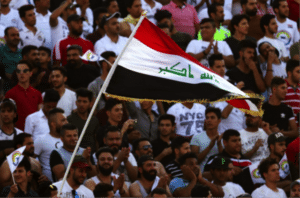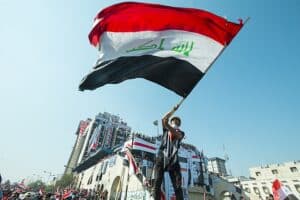Iranian leader Ali Khamenei (left) with Muqtada al-Sadr (right) – WikiMedia Commons
Lawmakers from Iraq’s largest parliamentary bloc – the Sadrists – have stepped down after their leader Muqtada al-Sadr asked them to do so. The 73 Sadrist parliamentarians are a major force in the Iraqi parliament after the October 2021 elections. Sadr has tried to form a majority government ever since, but failed to do so due to major disagreements with rival Shia factions. Speaker of Parliament Mohamed al-Halbousi said to reluctantly accept the resignations.
The post-election process
According to the Iraqi constitution, a President is elected by two-thirds of parliament. The President subsequently nominates a new PM, crucial steps in the Iraqi political process in forming a new government. Historically, this process has been troublesome, as various Iraqi parties attempt to gain maximal power from coalition negotiations. Power in Iraq often comes in the form of a ministry, or powerful political appointments, ensuring financial benefits for their own constituencies and leverage over rival parties. In this set-up, Iraq has been entrenched in “consensus coalitions of national unity”. These foster clientelism and have completely bankrupted and crippled the Iraqi state.
Inability to elect a president
At first, these conventional proceedings seemed to be overhauled after the October 2021 elections. Breaking the post-2003 tradition of consensus coalitions, Sadr wanted to form a majority government with the Sunni Taqadoom party of speaker al-Halbousi and the Kurdish KDP of Kurdish President Barzani. This would exclude the powerful parties affiliated to the Hashd al-Shaabi (Popular Mobilization Forces), a conglomerate of Iran-loyal militias that have become forceful after the defeat of IS. Inside and outside parliament the Hashd has a major influence on Iraqi politics. As the election of a President needs the approval of two-thirds of MP’s, the Coordination Framework (parties affiliated to the Hashd) have been able to block all proceedings. This has completely paralyzed the Iraqi parliament, currently blocking important food and energy security bills from passing into law.
The parliament as a tool
For many of Iraq’s parties, the parliament is just a tool in attaining their share of Iraq’s scarce resources. Various parties seem now unable to settle disputes inside the legal, political framework. This is a major threat to Iraq’s fragile stability, as most parties have armed militias who are able to bring disputes from parliament to the Iraqi streets.
The vacancies of the 73 Sadrist parliamentarians will be filled by the runner-ups in these districts during recent elections. In most cases, these will be ‘Coordination Framework’ parliamentarians, as these opposed Sadr during elections in Shia-dominated areas of Iraq.
It seems unlikely that firebrand cleric Sadr, immensely popular in Shia constituencies, will accept this outcome. It is rumored that he already rallied his militia ‘Saraya Salam’ who have started recruiting in the Babylon and Diyala provinces.
A political trick?
Iraq’s parliamentary holidays commenced on June 9, meaning MPs will only return in August. For the resignations to become official, an absolute majority appears to be needed after reaching quorum. This seems unlikely – and political analysts have already hinted on the resignations being a strategic move by Sadr and Halbousi to hand responsibility in the political process to the CF, while not abandoning power altogether.
As ever, Iraq’s political trajectory is highly unpredictable. As UN’s special envoy to Iraq, Jeanine Hennis-Plasschaert said at her latest address, political deadlock in the Iraqi political theater must end, as streets might “boil over”. One-third of Iraqi’s currently lives in poverty, and a stable government is crucial to finally meet the needs of the impoverished Iraqi people – latest moves by Sadr do not seem to contribute in this direction.
Sources: Al Jazeera Al Arabiya France24
Photo: WikiMedia Commons



